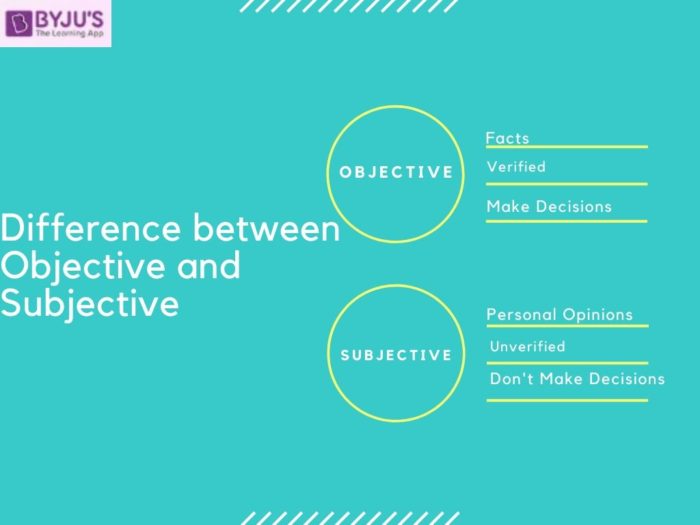Difference between Objective and Subjective is explained here in detail.
Whenever the statement can be debated, whenever the observations or assessments are laced with personal interpretations and not based on facts, then one can say that the statement is subjective in nature.
Objective means making an unbiased, balanced observation based on facts which can be verified. A statement or assessment is said to be objective when it can be verified and it does not have any interpretations based on emotions of a person.
Aspirants preparing for the Civil Services Exam can visit the given link for information on eligibility, dates and structure of IAS Exam.
Difference between Objective and Subjective – UPSC Notes:- Download PDF Here

Key Differences Between Objective and Subjective
Given below is a tabulated difference between objective and subjective. Candidates can refer to these points of difference to understand the terms better:
| Objective | Subjective |
| Objective means making an unbiased, balanced observation based on facts which can be verified. | Subjective means making assumptions, making interpretations based on personal opinions without any verifiable facts. |
| Objective observations or assessments can be used before arriving at any decisions. | Subjective observations or information should not be used while taking any important decisions. |
| Objective information can be found in Scientific journals, research papers, textbooks, news reporting, encyclopedias etc. | Subjective observations can be found in biographies, blogs, editorials of newspapers etc. |
| An Objective observation or assessment is made after necessary information is verified | A Subjective assessment is made without verifying the necessary information. |
| An objective statement is provable and can be easily measured | A subjective statement is relative to the person in concern |
| This is a method of stating or storytelling the truth in a systematic manner from all perspectives | Any subjective information is derived from the opinion, or interpretation of a character and may depend on personal beliefs |
After learning about the differences between Objective and Subjective, visit the below given links to keep oneself updated with the latest current affairs. Also, refer to the links on Daily Hindu Video Analysis and Daily Press Information Bureau analysis.
- Latest Current Affairs
- Daily Hindu Video Analysis
- Daily Press Information Bureau Analysis
- Complete List of Difference between Articles – History, Polity, Economics, Geography and more
Apart from the difference between objective and subjective, IAS aspirants can also visit the Difference Between Articles page and get 100+ articles from various fields and subjects to prepare for the upcoming UPSC and government exams.
Objective vs Subjective
To simplify the difference between the two terms, given below is an example to know the difference between subjective and objective.
- “Bharatnatyam is one of the oldest Indian classical dance forms.” This is an objective statement as it is a fact and has been known for years.
- “Even after putting in efforts, not everyone can learn how to perform Bharatnatyam”. This is a subjective statement since it is a person’s opinion and is subjective to vary from person to person.
Thus, the key difference between objective and subjective is that objective information is based on unbiased and factual data. Whereas, subjective statements are biased and based on opinions and interpretations.
Difference between Objective and Subjective – UPSC Notes:- Download PDF Here
For more articles and exam-related preparation materials for UPSC 2023, refer to the links given in the table below.
Related Links
| IAS Salary | Static GK |
| What is DRDO | Srushti Jayant Deshmukh Age |
| Non Banking Financial Institutions | Article 324 of Indian Constitution |
| Special Purpose Vehicle | Ujala Yojana |
Comments